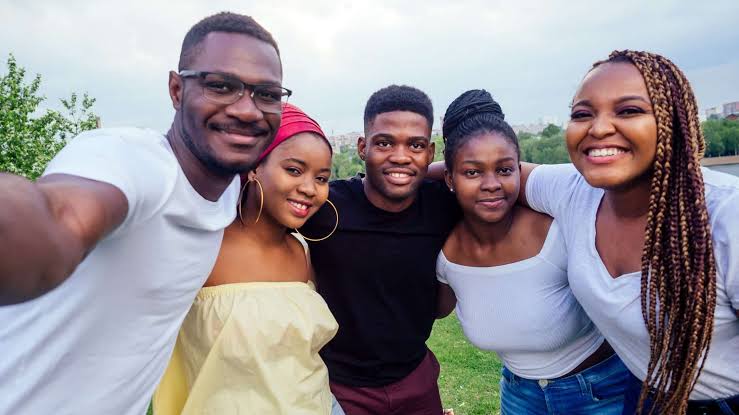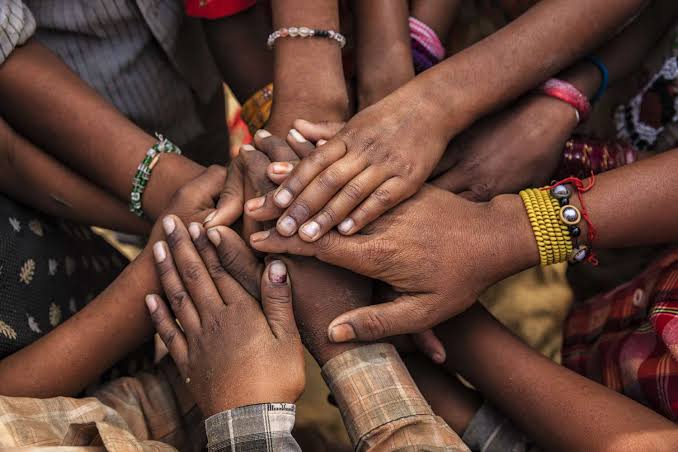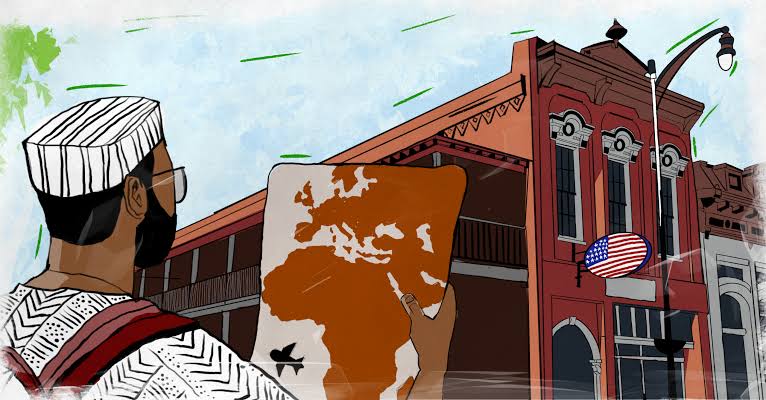Borrowed Accents, Borrowed Selves: The Performance of Identity in Diaspora Spaces

Migration is rarely a one-and-done act. It begins long before the plane lifts off the tarmac and continues long after passports are stamped. For millions of Africans living abroad, migration is a continuous negotiation of identity; a balancing act between who they were, who they are expected to be and who they are becoming. Every interaction, from a casual office conversation to ordering groceries in a new city, requires a subtle performance, a careful calibration of language, behavior and appearance.
Identity in diaspora spaces is neither fixed nor fully authentic. It is performed, shaped by necessity and honed by experience. The journey of adapting to a new environment often starts with small shifts such as a softened accent to avoid repeated explanations, a measured laugh to signal politeness and a strategic smile to mitigate misunderstanding. Over time, these performances accumulate, becoming a framework through which migrants navigate unfamiliar social and cultural landscapes.
The Accent as a Survival Tool
One of the earliest and most visible shifts occurs in speech. Accents, while natural in a homeland context, acquire new weight abroad. They become markers of intelligence, cultural fit and acceptability. For many migrants, the first months in a new country involve adjusting the way they speak, consciously or unconsciously.
These changes are rarely trivial. Accents carry memory, heritage and identity. Modifying it, even subtly, can sometimes feel like eroding a part of oneself. Beyond speech, migrants often adopt idiomatic phrases, change the rhythm of their sentences, or drop certain words entirely to sound neutral. This process can generate a mix of pride and alienation: pride in being understood, but alienation from one’s roots. The act of adjusting speech is as much emotional as it is practical, shaping how migrants see themselves and are perceived in society.
Performing Self Across Multiple Spaces
While accents are perhaps the most immediate form of adaptation, the performance of self extends far beyond speech. Migrants learn to calibrate their behaviour depending on context, from workplaces to public spaces. Politeness, posture, dress codes and even dietary choices are adjusted to fit local norms. Often times, they find themselves negotiating micro-behaviours daily.
Spaces such as churches, community centres and markets offer temporary relief, environments where the migrant can express a more authentic self. However, settings also become arenas of subtle peer pressure, as one must perform cultural competence correctly or risk judgment. Humor, storytelling and informal social rituals are all forms of identity maintenance that allow migrants to reclaim the familiarity of home while abroad.

The Tightrope of Belonging
There is a delicate navigation involved in a relocation. In foreign contexts, there is pressure to conform, minimize visibility, to reduce potential conflict. Within diaspora communities, there is a different pressure to remain true to heritage, to display cultural literacy and to maintain credibility among peers.
This dual demand shapes behaviour, influencing everything from interpersonal interactions to broader life choices. Migrants may adopt gestures or communication styles that signal non‑threat, reduce misunderstandings and facilitate integration. Even seemingly trivial behaviours, like how one queues or responds to authority, are laden with social negotiation. The mental load of maintaining these performances is significant. Over time, the migrant may struggle to discern which behaviours are authentic, which are adaptive and which have become internalized.
Diaspora Connect
Stay Connected to Home
From Lagos to London, Accra to Atlanta - We Cover It All.
The pressure intensifies in professional settings, but in social gatherings, cultural norms clash subtly. The constant balancing fosters a kind of hyper-awareness, where every action is evaluated for social effect, creating both resilience and fatigue.
Body Language and Cultural Navigation
Language is only one dimension of performance, the body itself becomes a site of adaptation. Migrants often adjust posture, gestures and facial expressions to navigate foreign environments safely. Parents often pass these strategies to their children. Nigerian and Ghanaian families in Canada and the UK, for instance, teach their children how to interact with authority figures, how to behave in public and how to navigate spaces where cultural misunderstandings are likely. Children quickly internalize these embodied lessons, sometimes without conscious awareness, shaping their understanding of social hierarchy and community norms. These embodied behaviours, initially conscious adaptations, often become second nature over time, shaping identity on a physical as well as psychological level.
Even seemingly mundane actions become sites of cultural negotiation, revealing the depth to which migrants continuously adapt their daily lives.
Homecomings and the Mirror Effect
Returning home, even briefly, can reveal the transformations that migration has wrought. Migrants often feel out of step with familiar surroundings. Friends, family, and neighbours may comment on altered speech, dress, or behaviour. These observations are rarely critical but underscore the subtle ways in which identity is reshaped abroad.
For many, this creates an internal tension, they are neither entirely who they were before leaving nor fully aligned with who they have become. Short visits home can highlight the dissonance, intensifying feelings of displacement and complicating notions of belonging. Social expectations clash too. Their children also face similar challenges. Being raised abroad, they inherit the adaptive strategies of their parents while simultaneously negotiating local cultural norms. They speak their parents’ languages with hesitation, blend linguistic codes, and navigate social expectations that are sometimes contradictory. This mirror effect can leave migrants reflecting on how much of their identity is truly theirs and how much is shaped by context, necessity or survival.
Negotiating Identity in Migration
The performance of identity is amplified in migration because it disturbs the constants of life, such as geography, language, community, social norms and status. Adaptation becomes a necessity rather than a choice. Identity, once a given, becomes a carefully managed project.

Some migrants adapt fluidly, integrating seamlessly into host societies while maintaining strong connections to their heritage. Others struggle, negotiating multiple selves and the emotional labour that comes with constant performance. The cumulative effect is a unique form of cultural fluency, an ability to operate across multiple social and cultural contexts simultaneously.
At the core, this performance is neither deception nor weakness. It is survival, resilience and negotiation. Every accent softened, every gesture measured and every behaviour calibrated tells a story of adaptation, belonging and the pursuit of stability in unfamiliar spaces. Migrants often describe this process as simultaneously empowering and exhausting, shaping both self-confidence and cultural consciousness in profound ways.
Diaspora Connect
Stay Connected to Home
From Lagos to London, Accra to Atlanta - We Cover It All.
The Multiplicity of Self
Migrants do not abandon their identities, they simply multiply them. Each performance, whether in response to external expectations or internal negotiation, goes to contribute to a complex, layered sense of self. Identity becomes a mix of heritage, adaptation and experience. In diaspora spaces, migrants learn to navigate social expectations, cultural differences and personal transformations. They perform borrowed accents, borrowed behaviours and borrowed selves, not to deceive, but to survive and thrive. In doing so, they develop a unique resilience and cultural fluency that reflects the ongoing negotiation of identity in a globalized world.
The story of the diaspora is one of continuous adaptation. Identity is never static. It is performed, recalibrated and reconstructed, reflecting both the challenges of migration and the creativity of those who navigate it. In the end, borrowed accents and borrowed selves are not just markers of survival, they are testament to the enduring flexibility and depth of the human spirit.
Recommended Articles
Southern Europe’s Travel Sector Surges as High-Yield Charter Demand Drives Luxury Boom

Africa's inbound tourism is strategically pivoting towards Southern European markets, identifying Portugal, France, and ...
Davido's DNA Scandal Ignites: Leaked Chats Fuel Baby Mama Drama

A deepening paternity dispute involves Afrobeats star Davido and teenager Anuoluwapo Mitchelle, whose mother, Ayo Labinj...
You may also like...
When Sacred Calendars Align: What a Rare Religious Overlap Can Teach Us

As Lent, Ramadan, and the Lunar calendar converge in February 2026, this short piece explores religious tolerance, commu...
Arsenal Under Fire: Arteta Defiantly Rejects 'Bottlers' Label Amid Title Race Nerves!

Mikel Arteta vehemently denies accusations of Arsenal being "bottlers" following a stumble against Wolves, which handed ...
Sensational Transfer Buzz: Casemiro Linked with Messi or Ronaldo Reunion Post-Man Utd Exit!

The latest transfer window sees major shifts as Manchester United's Casemiro draws interest from Inter Miami and Al Nass...
WBD Deal Heats Up: Netflix Co-CEO Fights for Takeover Amid DOJ Approval Claims!

Netflix co-CEO Ted Sarandos is vigorously advocating for the company's $83 billion acquisition of Warner Bros. Discovery...
KPop Demon Hunters' Stars and Songwriters Celebrate Lunar New Year Success!

Brooks Brothers and Gold House celebrated Lunar New Year with a celebrity-filled dinner in Beverly Hills, featuring rema...
Life-Saving Breakthrough: New US-Backed HIV Injection to Reach Thousands in Zimbabwe

The United States is backing a new twice-yearly HIV prevention injection, lenacapavir (LEN), for 271,000 people in Zimba...
OpenAI's Moral Crossroads: Nearly Tipped Off Police About School Shooter Threat Months Ago
ChatGPT-maker OpenAI disclosed it had identified Jesse Van Rootselaar's account for violent activities last year, prior ...
MTN Nigeria's Market Soars: Stock Hits Record High Post $6.2B Deal

MTN Nigeria's shares surged to a record high following MTN Group's $6.2 billion acquisition of IHS Towers. This strategi...
